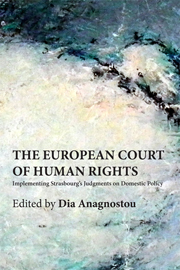Book contents
- Frontmatter
- Contents
- The contributors
- Acknowledgements
- Introduction: Untangling the domestic implementation of the European Court of Human Rights' judgments
- Part I INSTITUTIONAL DYNAMICS OF DOMESTIC IMPLEMENTATION
- 1 The interrelationship between domestic judicial mechanisms and the Strasbourg Court rulings in Germany
- 2 Between political inertia and timid judicial activism: the attempts to overcome the Italian ‘implementation failure’
- 3 The reluctant embrace: the impact of the European Court of Human Rights in post-communist Romania
- Part II LEGAL MOBILISATION AND THE POLITICAL CONTEXT OF IMPLEMENTATION
- List of European Court of Human Rights judgments and European Commission on Human Rights cases
- Index
3 - The reluctant embrace: the impact of the European Court of Human Rights in post-communist Romania
from Part I - INSTITUTIONAL DYNAMICS OF DOMESTIC IMPLEMENTATION
Published online by Cambridge University Press: 05 April 2014
- Frontmatter
- Contents
- The contributors
- Acknowledgements
- Introduction: Untangling the domestic implementation of the European Court of Human Rights' judgments
- Part I INSTITUTIONAL DYNAMICS OF DOMESTIC IMPLEMENTATION
- 1 The interrelationship between domestic judicial mechanisms and the Strasbourg Court rulings in Germany
- 2 Between political inertia and timid judicial activism: the attempts to overcome the Italian ‘implementation failure’
- 3 The reluctant embrace: the impact of the European Court of Human Rights in post-communist Romania
- Part II LEGAL MOBILISATION AND THE POLITICAL CONTEXT OF IMPLEMENTATION
- List of European Court of Human Rights judgments and European Commission on Human Rights cases
- Index
Summary
Romania's politics after its 1989 ‘entangled revolution’ can be roughly divided into two phases. The first phase was one of democratisation, following the only ‘revolution’ in central and eastern Europe which did not bring about a victory for anti-communists in the subsequent elections. Ion Iliescu, a former communist leader, and his populist National Salvation Front (NSF), which campaigned with slogans against party politics and Western capitalism, won an overwhelming victory after the first free but unfair elections in May 1990. The second phase was one of consolidation, which started with the peaceful departure from power of Iliescu in 1996, after he lost the elections to a coalition formed by anti-communists and deserters from his own party. The transition in the period 1990–6 saw highly contentious politics in Romania, as well as considerable civil unrest. The emerging civil society contested Iliescu, who in turn resorted to the help of vigilante miners to keep his opponents in check.
Following on from the legacies of the Ceausescu regime, this early contentious transition only increased the challenges to human rights protection. In the early 1990s Romania had the worst Freedom House scores of all former Warsaw Pact countries other than the former Soviet Union. In 1991, however, a Constitution was adopted, which reconfirmed Romania as a fused unitary and strongly centralised state. It included, however, an important limitation to the principle of sovereignty in connection with human rights.
- Type
- Chapter
- Information
- The European Court of Human RightsImplementing Strasbourg's Judgments on Domestic Policy, pp. 71 - 94Publisher: Edinburgh University PressPrint publication year: 2013



